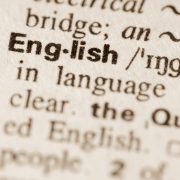The English Language Is the Product of Spontaneous Order
No matter how many examples there are of spontaneous order emerging out of chaos, there are still those who cannot bring themselves to believe that such a system, or lack thereof, is possible. In previous essays, I have shown that spontaneous order is not only possible but that it is already happening all around us. And while previous articles touched on dancing, roads, and survival instincts in nature, this essay focuses on something we use every day: language.
The ability to form complex languages is what separates humans from all other living species. And language, like markets, spontaneously derive from necessity, whether of a good or service or of communication. And just as humans are anxious to exchange money for desired goods and services, so are they eager to communicate with others to facilitate the exchange of ideas. But neither scenario requires any action from any central authority.
The English we speak today is different than the English used by our Founding Fathers. But these organic changes occurred in the absence of a central authority controlling and dictating the terms. And yet, considering all this, somehow we are still able to communicate with each other.
The English Language
The English language is unique. Younger than many others, there really is no “pure” English language. Instead, it borrows from a variety of different languages to form something completely new altogether. As American Enterprise Institute’s (AEI) Mark Perry points out, “If you speak English, you know words from at least a hundred different languages. That’s because English has borrowed words from languages everywhere, and continues to do so.”
But while this may seem like a chaotic way to form a language, human beings have managed to adjust adopt new words without the need for government mandates. And as a result, the English language is a free-flowing exchange of ideas.
Perry writes:
“Nobody is in charge! Human languages in general, and English in particular are perfect examples of “spontaneous order,” the spontaneous emergence of self-organization and order out of seeming chaos. And perhaps it’s because English has been the language most open to borrowing words from other languages that is has developed the most extensive and richest vocabulary.”
An Abundance of Choice
But the same cannot be said of other languages. Unlike America, which prides itself on the exchange of different cultural ideas, France is homogeneous by nature. The French government prefers to keep its culture rooted in French tradition, and language is no exception to this rule.
As Perry says:
“The opposite approach to allowing a language to develop according to spontaneous order, is that of the French Academy, which actively tries to limit the French vocabulary and prevent the “anglicisation” of the French language.”
In fact, France is so controlling over its language, it even controls what you are allowed to name your children. Parents looking to bestow an untraditional name upon their children must first prove that the name has been previously established elsewhere. In many instances, this means having to use contemporary literature to justify “untraditional” names.
This type of central control serves only to limit the exchange of ideas within the country because spontaneous action cannot occur. It must first be sanctioned by the French government. And just like government regulation inhibits market innovation, so does it also inhibit individual freedom by restricting language.
But France is not alone in this. In another article, Perry writes:
“Number of words in the English language:500,000 according to the number of words in the Oxford English Dictionary. There are supposedly another 500,000 uncataloged technical and scientific terms. By comparison, most estimates indicate that German has a vocabulary of about 185,000 words and French and Spanish have fewer than 100,000 words.”
With such an abundance of words, the English language allows us the opportunity to better communicate our thoughts and feelings with others. Along those same lines, allowing for more options in a free and spontaneous marketplace allows consumers more options to better suit their personalized needs. But like language, the only thing that stands in the way of consumers and seemingly unlimited options is government regulation.




